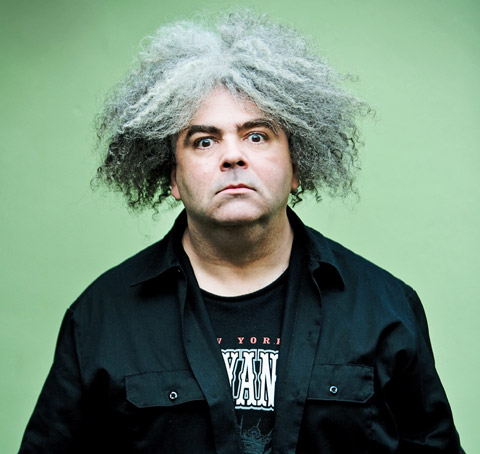
NO LOVE BUZZ “Look, Nirvana’s audience, Soundgarden’s audience, those people had no interest in us,” says King Buzzo. “None of them. It’s true. That was reality.” |
"Fuck you!" I'm speaking with Roger "King Buzzo" Osbourne, guitarist and main mouthpiece for legendary art-metalers Melvins. The sentiment isn't aimed at me — well, not directly, I think, since it comes in the midst of a lengthy rant directed at the band's fans who don't seem to get that, uh, the days of business as usual are over (see sidebar). "It's over, move on! I have!" He doesn't sound like he has, but that's the charm of the King Buzzo that we all know and love: three decades in the sludge business, his aggro bent and will to do whatever the fuck he wants has fueled a vast legacy built on towering riffage, sheer noise, and off-the-wall weirdness.
"I have always assumed that I have good taste," explains Buzzo. "So if I like what I do, other people will like it, right? That's it. We just do what we want to do, and if other people are into it, fine. All the better. If they aren't, well, there isn't a whole lot that we can do about that."
One listen to even a fragment of any of the 20-plus long-players the band have released since forming in 1983 in Montesano, Washington, will reveal an entrenched sense of idiosyncrasy. The band's greatest renown is for being influential in the Seattle-scene grunge-pop movement of the early '90s. But whereas the usual culprits of that whole musical world tended to find a well-flanneled groove and ride it to the cash trough, Melvins took the road less traveled. They filled their albums with the aggression of hardcore punk, the yawning open-chasm riffage of '70s metal, the found-sound kitchen-sink shock terror of, say, Throbbing Gristle, grounded to an abiding love for well-executed classic rock.
The result is an intimidating discography that's impossible to sum up — not that the band is above trying, especially with their current tour, which comes to the Paradise June 3 and 4, tackling five of their more well-known records (Lysol, Eggnogg, and Houdini on night one, Bullhead and Stoner Witch the following evening). The standard line on Melvins is that they were slow when their punkier brethren were fast, creating a signature sludgy crawl that was abrasive, howling, and punishing. And certainly, sludge is something Buzzo and Co. excel at, whether during the side-long instrumental tower of bludgeon that begins 1992's Lysol or the agonizingly downtuned grime of godhead riff torment that makes up the bulk of 1991's sublime Bullhead. But amidst the pounding is a restless will to be weird, whether in the nods to '60s psychedelia on 1994's major-label (Atlantic) high point Stoner Witch or the spazz-metal-boogie of '92 single "Honey Bucket" from Houdini. "We really, honestly, just do things the way we would want other bands that we are fans of to do," says Buzzo. "Being weird for weird's sake, we don't have much interest in that."
This head-down attitude has enabled the band to weather good times and bad, from their awkward beginnings as metal-obsessed dropouts bum-rushing the hardcore scene of '80s Washington to their eventual brush with fame when their original roadie turned out to be Kurt Cobain, voice of a generation, or something to that effect. Not that they ever had fame handed to them — it wasn't as if being named-dropped by hip band dudes was a blank check or anything. "Look, Nirvana's audience, Soundgarden's audience, those people had no interest in us. None of them. It's true. That was reality. We were never a part of that. But you know what, that was a long time ago, a lifetime ago. Cobain's been dead a long, long time."
So true — and though the Class of 1993 bands all seem frozen in amber with their shorts over long underwear and lumberjack howl, Melvins have spent the ensuing decades slowly shifting their legacy, album by album, to the point where they can do anything — from the electronica of their Chicken Switch remix album in '09 to straight-up '80s punk of their '00s collaborations with Jello Biafra. "Basically," Buzzo explains, "when we are thinking about things, a big part of me continually thinks 'Why not?' We're not afraid of trying things, giving them a shot, if not just for the weirdness factor alone."
Of course, Buzzo's ready-for-anything nonchalance can often come across as arrogance at best, hostility at worst — but truth be told, it's the mark of a musician who has found a way to make sheer aggression and limitless experimentation work for a sustained period outside of the mainstream. "I never wanted to be part of any club — but it's hard, being on the outside. I mean, there's nowhere I really feel comfortable with. But that said, I think our music is easy to like, personally. I just set out to do music that I like, as a band. Do people have a problem with that? There's not much I can do."